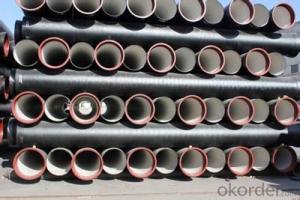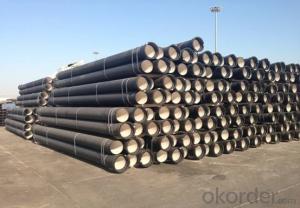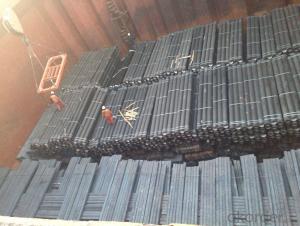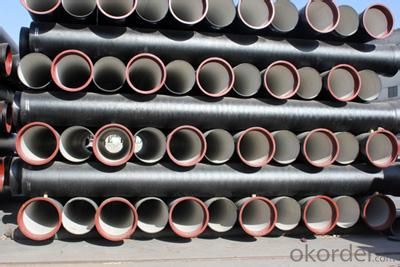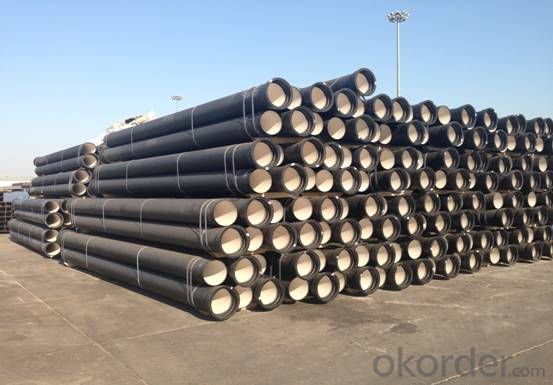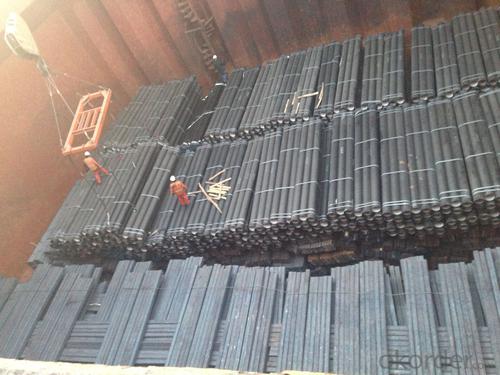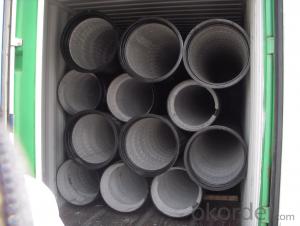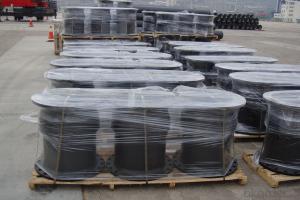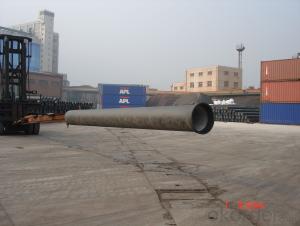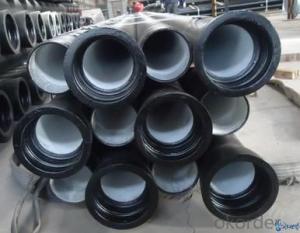DUCTILE IRON PIPE C Class DN800
- Loading Port:
- China Main Port
- Payment Terms:
- TT OR LC
- Min Order Qty:
- -
- Supply Capability:
- -
OKorder Service Pledge
OKorder Financial Service
You Might Also Like
Ductile Iron Cast Pipe is without any defects compare with tradition casting tech, which has many advantages particularly as follow:
(1) High density. In the "vertical upward casting" process, the melt iron of centre liquid column in center crystallizer is continuously feeding for volume shrinkage caused by condensation tube at outer circumference , which lead to be free of shrinkage porosity.
(2) High purity. When melt iron pouring, the mixed impurities such as gas, dross, sand grain which are lighter than melt iron could be eliminated at furnace mouth, its impossible to enter into the crystallizer through the channel, so the melt iron into the crystallizer is very pure.
(3) Strength with toughness. The cooling speed provided by continuous crystallizer is 30 times than sand casting and 5 times than centrifugal casting, and doesn't produce white iron, the eutectic cell volume of continuous cast iron is one eighth to one tenth compare with traditional cast iron. The density of graphite nodule in ductile iron can reach 300-700 pcs/mm2. Therefore, all reason above improve the strength and toughness of continuous cast iron.
(4) Free machining. The high speed cooling make the hardening phase (such as boride, steadite) not appear like reticular, massive or thick, but diffuse like fish bone and pane in shape, moreover, there are tiny graphite flakes inlaid hardening phase. It's free machining in BrinellHardness the range of 250-300HB. However, the Brinell Hardness of 250 is top limit to common metal materials.
(5) Uniform composition of tube wall. The convection mixing of liquid column caused by marching type drawing in crystallizer make the composition of tube wall well-distributed, and concentration gradient very little.
(6) High productivity. To the wall thickness of tube under 10mm, the speed of continuous casting is 1 meter/min, to the wall thickness of tube under 20mm, the speed of continuous casting is 0.5 meter/min, which is high efficiency that centrifugal or other casting tech couldn't reach.
- Q: Can ductile iron pipes be used for water main extensions?
- Water main extensions can utilize ductile iron pipes. These pipes are recognized for their robustness and longevity, making them a fitting option for extending water mains. They possess the capability of withstanding high pressure and resisting corrosion, essential for guaranteeing the durability and dependability of the water distribution system. Moreover, ductile iron pipes have a sleek interior surface, minimizing friction and enhancing the efficiency of water flow. In general, due to their favorable mechanical properties and capacity to withstand the demands of water distribution systems, ductile iron pipes are commonly employed in water infrastructure projects, including water main extensions.
- Q: How does ductile iron pipe handle temperature changes?
- Ductile iron pipe is designed to handle temperature changes effectively. Its composition and structure make it highly resistant to thermal expansion and contraction, minimizing the risk of damage. This property allows the pipe to withstand extreme temperature variations without compromising its structural integrity, making it a reliable choice for various applications where temperature fluctuations are common.
- Q: Can ductile iron pipes be used for underground slurry pipelines?
- Underground slurry pipelines can utilize ductile iron pipes, as they possess strength, durability, and resistance to corrosion, making them suitable for various applications. Their qualities make them reliable and cost-effective in transporting mixtures of solids and liquids over long distances. Ductile iron pipes can endure the abrasive nature of slurry and the external loads associated with underground installation, owing to their inherent toughness and flexibility. Moreover, they can be easily connected through different methods, ensuring a secure and leak-free pipeline system. Nonetheless, it is crucial to assess the specific properties of the slurry being transported and seek professional advice to determine the suitable pipe specifications and design considerations for the underground slurry pipeline.
- Q: How does ductile iron pipe resist internal corrosion?
- Ductile iron pipe resists internal corrosion due to the protective barrier formed by its cement lining. This lining acts as a barrier between the iron pipe and the transported fluid, preventing direct contact and minimizing the chances of corrosion. Additionally, the high carbon content in ductile iron enhances its corrosion resistance compared to other types of iron pipes.
- Q: How does ductile iron pipe perform in areas with high groundwater contamination?
- Ductile iron pipe performs well in areas with high groundwater contamination due to its corrosion-resistant properties. It can withstand the corrosive effects of contaminated water and maintain its structural integrity over time, making it a reliable choice for such environments.
- Q: Can ductile iron pipes be used for gas distribution systems?
- Yes, ductile iron pipes can be used for gas distribution systems. Ductile iron pipes are known for their strength and durability, making them suitable for carrying various types of fluids, including natural gas. These pipes have excellent corrosion resistance and can withstand the high pressure and stress typically associated with gas distribution systems. Additionally, ductile iron pipes are cost-effective and have a long lifespan, making them a reliable choice for gas distribution networks.
- Q: How is ductile iron pipe different from other types of pipes?
- Ductile iron pipe is different from other types of pipes primarily due to its superior strength and durability. Unlike traditional cast iron pipes, which are more brittle and prone to cracking, ductile iron pipes are highly resistant to impact and can withstand higher pressure. Additionally, ductile iron pipes have the advantage of being more flexible and easier to install, making them a preferred choice for various applications such as water and sewage systems.
- Q: Can ductile iron pipe be used for municipal water supply?
- Yes, ductile iron pipe can be used for municipal water supply. Ductile iron pipe has excellent strength and durability, making it suitable for carrying the high-pressure water supply required for municipal systems. Additionally, its corrosion resistance and long lifespan make it a reliable choice for transporting water in urban areas.
- Q: Can ductile iron pipes be used in areas with high levels of heavy metal contamination?
- Areas with high levels of heavy metal contamination can indeed utilize ductile iron pipes. Ductile iron, known for its strength and durability, is resistant to corrosion, thus making it ideal for various environmental conditions, including those with heavy metal contamination. The structural integrity and performance of ductile iron pipes remain unaffected by the presence of high levels of heavy metals in the surrounding soil or water. These pipes feature a protective lining, typically made of cement mortar or polyethylene, which acts as a barrier between the pipe and its environment. This lining effectively prevents the leaching of heavy metals into the flowing water. Moreover, ductile iron pipes have demonstrated exceptional resistance to chemical corrosion, including that caused by heavy metals. Consequently, they have been extensively used in industrial settings where heavy metal contamination is prevalent, such as wastewater treatment plants, industrial facilities, and mining sites. However, it is crucial to emphasize the importance of regular monitoring and maintenance for ductile iron pipes, even though they can withstand high levels of heavy metal contamination. These measures ensure that the protective lining remains intact and any potential issues are promptly addressed. In conclusion, ductile iron pipes are a suitable choice for areas with substantial heavy metal contamination. Their strength, durability, and resistance to corrosion make them a reliable option for transporting water and other fluids, even in challenging environments.
- Q: How are ductile iron pipes protected against stray current corrosion?
- Ductile iron pipes are protected against stray current corrosion through the implementation of various preventive measures and protective coatings. Stray current corrosion occurs when an electric current passes through the pipe, leading to accelerated corrosion and potential damage. To prevent this, the following measures are typically adopted: 1. Electrical isolation: Ductile iron pipes are electrically isolated from other metallic structures using insulating materials, such as rubber gaskets or non-conductive coatings. This isolation prevents the flow of stray current through the pipe, minimizing the risk of corrosion. 2. Cathodic protection: Cathodic protection is a widely used technique to protect ductile iron pipes from stray current corrosion. It involves the installation of sacrificial anodes or impressed current systems near the pipe. These anodes or systems release a controlled electric current, which counteracts the stray current and ensures that the iron pipe remains cathodically protected. 3. Coatings: Ductile iron pipes are typically coated with protective layers to enhance their resistance against corrosion. One common coating is a fusion-bonded epoxy (FBE) coating, which provides a high level of protection against stray current corrosion. FBE coatings act as a barrier, preventing the electrical contact between the pipe and the surrounding environment. 4. Monitoring and maintenance: Regular monitoring and maintenance are essential to ensure the ongoing protection of ductile iron pipes against stray current corrosion. This involves inspecting the protective coatings for any damage or degradation and promptly repairing or replacing them as needed. Additionally, monitoring systems can be installed to detect and measure stray currents, allowing for timely intervention if necessary. By implementing these protection measures, ductile iron pipes can effectively guard against stray current corrosion, prolonging their lifespan and ensuring the integrity of the pipeline infrastructure.
Send your message to us
DUCTILE IRON PIPE C Class DN800
- Loading Port:
- China Main Port
- Payment Terms:
- TT OR LC
- Min Order Qty:
- -
- Supply Capability:
- -
OKorder Service Pledge
OKorder Financial Service
Similar products
Hot products
Hot Searches
Related keywords
